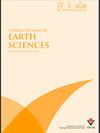南极洲南设得兰群岛罗伯特岛铜矿岩层中的安山岩成岩过程
IF 1.1
4区 地球科学
Q3 GEOSCIENCES, MULTIDISCIPLINARY
引用次数: 0
摘要
:南设得兰群岛是由侏罗纪至第四纪的岛弧火山活动形成的。罗伯特岛位于该群岛的中心,铜矿半岛位于罗伯特岛的西南部,出露了大量玄武岩和安山岩-玄武岩集合体的铜矿岩层。所调查的样本是在 2018 年 3 月至 4 月土耳其南极考察 2(TAE-II)期间从三重山东北部地区采集的。火山岩呈现出杏仁状的微石-斑岩质地。观察到拉长石、橄榄石和橄榄石的近方形至方形表晶,以及由斜长石、辉石和黝帘石组成的全晶基质。岩石学研究表明,囊泡最初被粘土矿物包覆,X 射线衍射研究表明,囊泡中主要填充的是安山岩和碳酸盐,沸石含量较少。在此,我们旨在讨论芒硝的形成。对安石灰进行的流体包裹研究显示,其均化温度在 83 ℃ 至 268 ℃ 之间。流体包裹体的共晶温度表明,这些矿物是由氯化钠为主的溶液形成的,其中含有少量氯化镁和氯化钙。这些包裹体的盐度介于 0.2-2.9 重量%的 NaCl 当量之间,最终的冰融化温度为 -1.7 至 -0.1°C。这些盐度值低于海水的平均盐度值,表明安石灰和纤维状沸石(thomsonite 和 stilbite)的形成与流星溶液密切相关。因此,流体包裹体的盐度值表明,来自冰川的流星水和海水以不同的速度混合在一起。本文章由计算机程序翻译,如有差异,请以英文原文为准。
The petrogenesis of analcime in the Coppermine Formation on Robert Island, South Shetland Islands, Antarctica
: The South Shetland Islands were shaped by island arc volcanism that occurred from the Jurassic to the Quaternary. Robert Island is located in the center of this archipelago, and Coppermine Peninsula, located on the southwestern part of Robert Island, exposures significant rock outcrops of basalts and andesitic-basaltic agglomerates of the Coppermine Formation. The investigated samples were collected during Turkish Antarctic Expedition 2 (TAE-II), in March–April 2018, from the area northeast of Triplet Hill. The volcanic rocks exhibited an amygdaloidal microlithic-porphyritic texture. Subhedral to anhedral phenocrysts of labradorite, augite, and olivine were observed with holocrystalline groundmass composed of plagioclase, pyroxene, and opaques. Petrographic studies revealed that the vesicles were initially coated with clay minerals, and X-ray diffraction studies showed that mostly analcime and carbonates, and less amount of zeolites filled the vesicles. Herein, it was aimed to discuss the analcime formation. Fluid inclusion studies performed on the analcime revealed homogenization temperatures ranging from 83 to 268 °C. The eutectic temperatures of the fluid inclusions suggested that these minerals were formed from NaCl-dominated solutions that contained a limited amount of MgCl 2 and CaCl 2 . The salinity of these inclusions ranged between 0.2–2.9 wt.% NaCl equivalent, and exhibited final ice melting temperatures of –1.7 to –0.1 °C. These salinity values, which are lower than the average salinity values of seawater, suggest that the formation of the analcime and the fibrous zeolites (thomsonite and stilbite) was closely associated with meteoric solutions. Consequently, the salinity values of the fluid inclusions suggest the mixing of meteoric waters form from glaciers and seawater at different rates.
求助全文
通过发布文献求助,成功后即可免费获取论文全文。
去求助
来源期刊

Turkish Journal of Earth Sciences
地学-地球科学综合
CiteScore
2.40
自引率
10.00%
发文量
6
审稿时长
6 months
期刊介绍:
The Turkish Journal of Earth Sciences is published electronically 6 times a year by the Scientific and Technological Research
Council of Turkey (TÜBİTAK). It is an international English-language journal for the publication of significant original recent
research in a wide spectrum of topics in the earth sciences, such as geology, structural geology, tectonics, sedimentology,
geochemistry, geochronology, paleontology, igneous and metamorphic petrology, mineralogy, biostratigraphy, geophysics,
geomorphology, paleoecology and oceanography, and mineral deposits. Contribution is open to researchers of all nationalities.
 求助内容:
求助内容: 应助结果提醒方式:
应助结果提醒方式:


